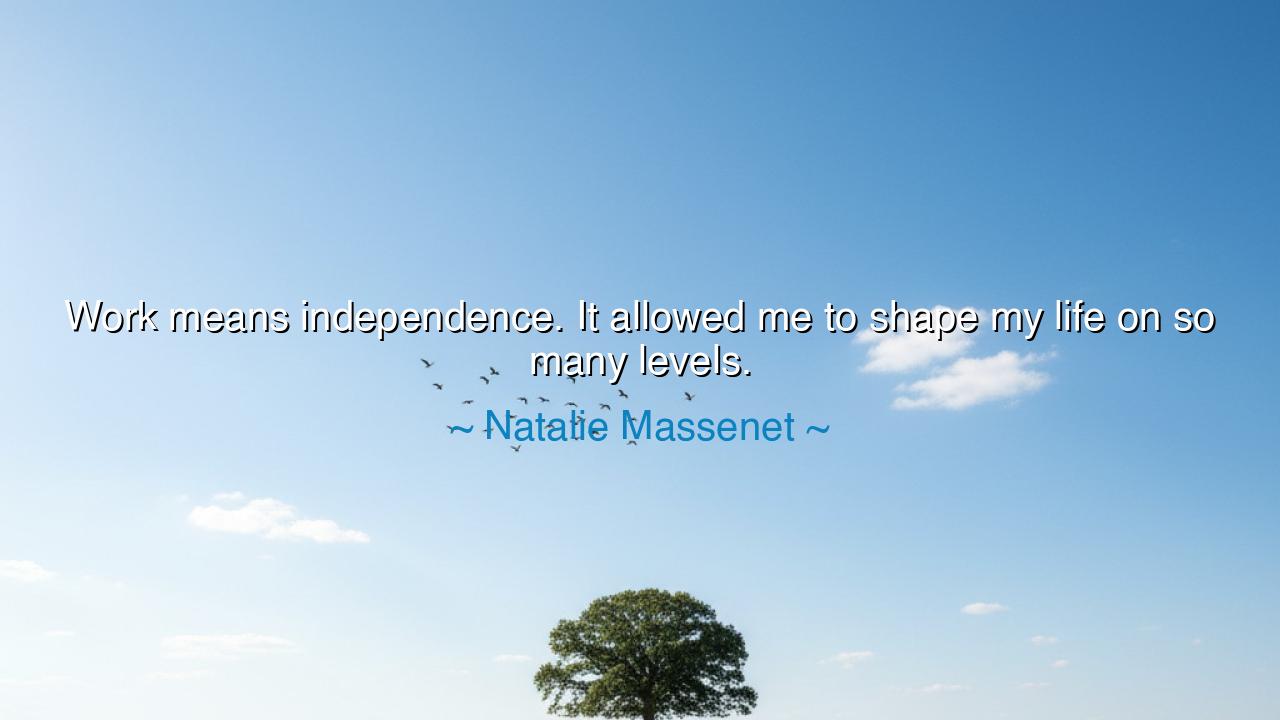
Work means independence. It allowed me to shape my life on so






Hear me, O children of the future, for in the words of Natalie Massenet lies a truth that echoes through the ages—the profound power of work to shape not just the external world, but the very essence of the self. She declares, "Work means independence. It allowed me to shape my life on so many levels." In these words, she speaks not just of the labor we do to earn sustenance, but of the transformative power that work holds, a power that frees the soul, enables growth, and allows us to carve our own destiny. It is a call to recognize that independence does not come merely from the lack of constraint, but from the act of shaping, creating, and forging ahead through work.
In the ancient world, great thinkers and leaders understood the power of work in shaping the individual. The philosopher Aristotle spoke of work as not just a means to survive, but as a path to virtue and fulfillment. For Aristotle, the active life, the life of toil and endeavor, was where the highest human potential was realized. The warrior, the craftsman, the scholar—each, through their work, crafted not only their craft, but their character. Just as Aristotle believed that the path to happiness lay in pursuing excellence through work, so too does Massenet recognize that work is not just a means of survival, but a means of self-empowerment and self-definition.
Consider the ancient Egyptians, whose monumental labor, through the building of their pyramids, left an eternal mark on the world. The pharaohs may have been the rulers, but it was the workers, the artisans, the builders, who shaped the very legacy of Egypt. The pyramids, though symbols of the rulers' might, stand as testaments to the power of work—the collective labor of a people, shaping not just the land but the future. In their work, the laborers of Egypt found independence, for in their craftsmanship, their perseverance, and their contribution to something greater than themselves, they defined their place in the eternal order of history. Massenet speaks of work in a similar light—it is through our work that we mold our futures, and through this, we secure our independence.
It is the same with all great lives, O children. Work is the hammer with which we forge our destinies, the soil in which we plant the seeds of independence. Consider Leonardo da Vinci, the master of many disciplines, who, through his tireless work as an artist, engineer, and inventor, became the very embodiment of the Renaissance ideal. His creations and inventions were not born from mere inspiration—they were born from his labor, his persistence, and his unyielding belief that through work, the soul could be shaped, liberated, and made immortal. Massenet reflects this same truth in her own journey, as she recognizes that work gave her the power to shape not only her career but her life, her identity, and her very existence.
And what of independence, O children? This is the heart of Massenet’s message. Work brings not only freedom from external constraints, but freedom from within. It is the ability to stand as a sovereign being, a creator of your own world, free from the whims and dictates of others. The ancient Romans understood this well. The Roman Republic was built on the work of citizens—farmers, soldiers, builders—who, through their efforts, ensured the prosperity and security of their nation. Independence was not merely a political ideal but a way of life. Each citizen, through their work, contributed to the Republic’s survival, and in doing so, secured their own place in the Empire. Similarly, Massenet speaks of work as the path to securing her independence, for in shaping her life through her efforts, she shaped not only her career but her freedom.
So, O children, take this wisdom into your hearts: work is not just the means by which we live—it is the means by which we define ourselves. Through work, we carve our place in the world, we shape our independence, and we create the future we desire. To toil is not a burden, but a privilege—a gift that allows us to shape not only the world around us but our own character and soul. Just as the ancient Greeks, the Romans, and the Egyptians built their legacies through their labor, so too can you build yours. In your work, find not just the means to survive, but the means to thrive, to grow, and to secure the freedom that comes from living your life on your own terms.
And so, O heirs of tomorrow, remember this: the path to independence is not paved with ease or idle hands, but with the tireless effort of work. Whether in art, in commerce, in education, or in any other field, it is through your labor that you will define who you are and what you stand for. Let your work shape your life as Massenet shaped hers, with purpose, passion, and the unwavering belief that in work, there is freedom and independence.






AAdministratorAdministrator
Welcome, honored guests. Please leave a comment, we will respond soon